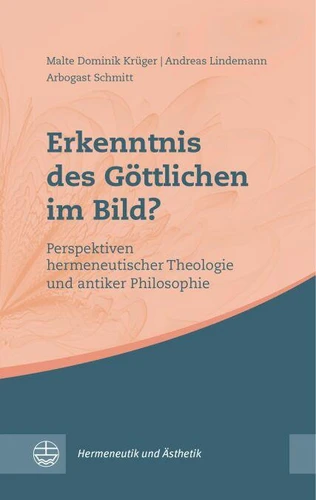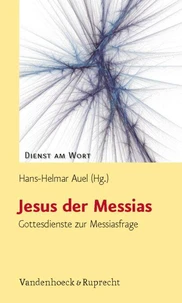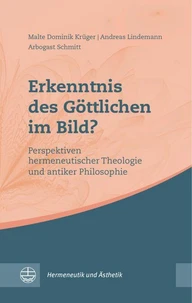- Accueil /
- Andreas Lindemann
Andreas Lindemann

Dernière sortie
Erkenntnis des Göttlichen im Bild?
Kann, darf oder muss man sogar das Göttliche im Bild darstellen? Angesichts der globalen Bilderwelt der neuen Medien und der Macht von Bildern im religiösen Kontext ergeben sich nicht nur neue Fragen, sondern es stellen sich auch alte Fragen neu: Vermag die Hermeneutik von Bildern ein Modell biblischer Textauslegung zu sein? Und: Kennen die hermeneutische Theologie und die antike Philosophie ein Bildkonzept, das seine eigene Vergegenständlichung kritisch durchkreuzt und theologisch wie philosophisch attraktiv ist? Diesen Fragen nähern sich die Autoren aus Perspektiven hermeneutischer Theologie und antiker Philosophie.
Damit werden die Vorträge der Marburger Bultmann-Lecture 2019 dokumentiert, die auch zur kulturwissenschaftlichen Verständigung über die Bildlichkeit beitragen möchten. [Cognition of the Divine in the Image? Considerations from Hermeneutical Theology and Ancient Philosophy] Can, may, or must one, even, depict the divine visually? In considering global imageries of New Media and the authority of images in a religious context, both ancient and novel questions arise: Might a hermeneutics of the pictorial be a suitable model for biblical interpretation? And: Do hermeneutical theology and ancient philosophy know of a concept of image that critically crosses out its own objectification, thus becoming theologically and philosophically enticing? The authors approach these questions from perspectives of hermeneutical theology and ancient philosophy, thus documenting papers from the 2019 Bultmann-Lecture in Marburg, which aim to also contribute to the discourse on imagery within cultural sciences.
Damit werden die Vorträge der Marburger Bultmann-Lecture 2019 dokumentiert, die auch zur kulturwissenschaftlichen Verständigung über die Bildlichkeit beitragen möchten. [Cognition of the Divine in the Image? Considerations from Hermeneutical Theology and Ancient Philosophy] Can, may, or must one, even, depict the divine visually? In considering global imageries of New Media and the authority of images in a religious context, both ancient and novel questions arise: Might a hermeneutics of the pictorial be a suitable model for biblical interpretation? And: Do hermeneutical theology and ancient philosophy know of a concept of image that critically crosses out its own objectification, thus becoming theologically and philosophically enticing? The authors approach these questions from perspectives of hermeneutical theology and ancient philosophy, thus documenting papers from the 2019 Bultmann-Lecture in Marburg, which aim to also contribute to the discourse on imagery within cultural sciences.
Kann, darf oder muss man sogar das Göttliche im Bild darstellen? Angesichts der globalen Bilderwelt der neuen Medien und der Macht von Bildern im religiösen Kontext ergeben sich nicht nur neue Fragen, sondern es stellen sich auch alte Fragen neu: Vermag die Hermeneutik von Bildern ein Modell biblischer Textauslegung zu sein? Und: Kennen die hermeneutische Theologie und die antike Philosophie ein Bildkonzept, das seine eigene Vergegenständlichung kritisch durchkreuzt und theologisch wie philosophisch attraktiv ist? Diesen Fragen nähern sich die Autoren aus Perspektiven hermeneutischer Theologie und antiker Philosophie.
Damit werden die Vorträge der Marburger Bultmann-Lecture 2019 dokumentiert, die auch zur kulturwissenschaftlichen Verständigung über die Bildlichkeit beitragen möchten. [Cognition of the Divine in the Image? Considerations from Hermeneutical Theology and Ancient Philosophy] Can, may, or must one, even, depict the divine visually? In considering global imageries of New Media and the authority of images in a religious context, both ancient and novel questions arise: Might a hermeneutics of the pictorial be a suitable model for biblical interpretation? And: Do hermeneutical theology and ancient philosophy know of a concept of image that critically crosses out its own objectification, thus becoming theologically and philosophically enticing? The authors approach these questions from perspectives of hermeneutical theology and ancient philosophy, thus documenting papers from the 2019 Bultmann-Lecture in Marburg, which aim to also contribute to the discourse on imagery within cultural sciences.
Damit werden die Vorträge der Marburger Bultmann-Lecture 2019 dokumentiert, die auch zur kulturwissenschaftlichen Verständigung über die Bildlichkeit beitragen möchten. [Cognition of the Divine in the Image? Considerations from Hermeneutical Theology and Ancient Philosophy] Can, may, or must one, even, depict the divine visually? In considering global imageries of New Media and the authority of images in a religious context, both ancient and novel questions arise: Might a hermeneutics of the pictorial be a suitable model for biblical interpretation? And: Do hermeneutical theology and ancient philosophy know of a concept of image that critically crosses out its own objectification, thus becoming theologically and philosophically enticing? The authors approach these questions from perspectives of hermeneutical theology and ancient philosophy, thus documenting papers from the 2019 Bultmann-Lecture in Marburg, which aim to also contribute to the discourse on imagery within cultural sciences.
Les livres de Andreas Lindemann

Die Exegese des 2 Kor und Phil im Lichte der Literarkritik
Eve-Marie Becker, Hermut Löhr, Andreas Lindemann, Dietrich-Alex Koch, Peter Arzt-Grabner
E-book
55,00 €

Kultur und Identität. Konstruktionen der Identität im europäischen Kontext
Andreas Lindemann, Christian Ammer
E-book
17,99 €

Gott am Kreuz. Gottesdienste zum Leben und Sterben Jesu
Hans-Helmar Auel, Werner H. Schmidt, Andreas Lindemann, Dietrich-Alex Koch, Stefan Alkier
E-book
6,00 €

Jesus der Messias. Gottesdienste zur Messiasfrage
Hans-Helmar Auel, Friedrich Avemarie, Jürgen Becker, Reinhard Feldmeier, Andreas Lindemann
E-book
6,00 €
